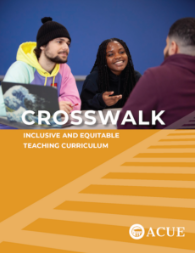As educators, we must work to create welcome and inclusive learning environments that promote equitable and successful outcomes for every student.
We also know that learning is more than an intellectual exercise. Students bring to our classes their hopes for the future, their fears of failure, and the range of emotions one experiences when encountering new and challenging ideas in dialogue with peers and professors. They also bring their life experiences and prior knowledge—assets to better understand and build on.
Achieving equity requires that we teach with practices that embrace the diversity of our students’ backgrounds. We must also thoughtfully review our instructional approaches to identify—and change—any unintended practices that might limit student expectations and achievements. Just as we approach our disciplines with prior assumptions and theoretical orientations, we must ensure that we approach our teaching, and our students, with equitable beliefs about their ability to learn and the opportunity gaps that we have the ability to close. As ACUE research shows, doing so leads to stronger levels of academic achievement indistinguishable by race, ethnicity and income level.
The need for effective, equitable instruction could not be greater. Today, only about half of the nation’s 17 million first-time undergraduates will graduate within a typical timeframe. Completion rates are even lower among first generation, low-income, and students of color. Despite a national goal to see 60% of young adults hold a college credential by 2025, a recent study by the Educational Testing Service (ETS) found that Black and Latinx men and women will not meet this goal for decades, if current trajectories remain unchanged. They must, and can, change, by focusing on the core of the collegiate experience to ensure that every student benefits from evidence-based instructional practices that promote inclusivity, persistence to graduation, and deeper levels of learning.
ACUE’s Effective Practice Framework© presents the core set of teaching skills and knowledge that every college educator needs to teach effectively. It is steeped in an asset-based philosophy that values students’ prior knowledge and experiences. We also recognize that too many college students, and disproportionately Black, Latinx, and Indigenous students, have been under-served in their previous educational experiences. Regardless of these backgrounds, and as research shows, educators equipped with proven methods have the ability to prepare these and all students for purposeful lives.
Inclusive teaching practices help all students’ learn, but are “especially beneficial to students who are members of groups underrepresented in their fields or traditionally underserved by institutions of higher education,” notes the Center for Teaching and Assessment of Learning at the University of Delaware, a recipient of the 2018 Higher Education Excellence in Diversity Award. The University of Michigan’s Center for Research on Learning and Teaching similarly explains that inclusive teaching occurs when faculty “deliberately cultivate a learning environment where all students are treated equitably, have equal access to learning, and feel welcome, valued, and supported in their learning [and] attend to social identities.”
Equity-promoting teaching practices are among the hundreds of recommended approaches that faculty learn about and develop in ACUE courses, as demonstrated in ACUE’s Inclusive and Equitable Teaching Curriculum Crosswalk. Faculty nationwide are implementing these approaches, and evidence shows that racial and income-based achievement gaps close when students are taught by ACUE-credentialed educators. ACUE is honored to partner with colleges and universities nationwide to ensure that higher education remains an engine of opportunity and mobility.
Sources:
Nettles, M. T. (2017). Challenges and opportunities in achieving the national postsecondary degree attainment goals. ETS Research Report Series. https://doi.org/10.1002/ets2.12141©2020 Inclusive and Equitable Teaching – ACUE Curriculum Crosswalk
https://ctal.udel.edu/resources-2/inclusive-teaching/ (retrieved January 15, 2020); Hall, C. “UD Received the 2018 Higher Education Excellence in Diversity Award,” University of Delaware, Sept. 2018, https://www.udel.edu/udaily/2018/september/excellence-diversity-inclusion-award/.
http://www.crlt.umich.edu/research-basis-inclusive-teaching, (retrieved January 15, 2020).

